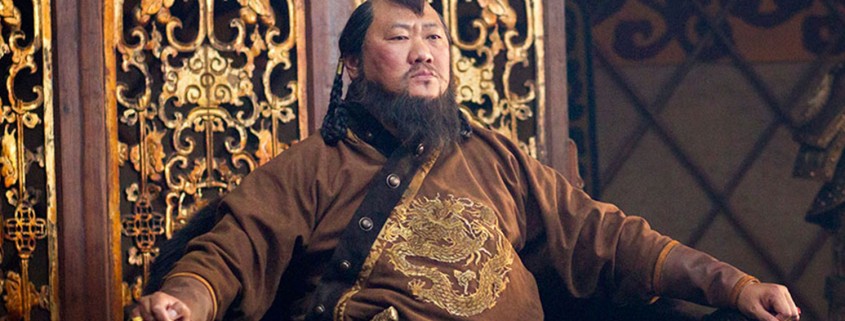Hollywood is ready for an Asian-American leading man
If art is a lens through which a society can view itself, the film and television industry has some curious insights into the perception of Asians.
The industry is venturing into brave new territory in casting decisions with the Netflix-produced historical fiction epic Marco Polo, which features a cast of Asian actors, including Benedict Wong as Kublai Khan and Korean-American Rick Yune in a high-profile supporting role. The $90 million Netflix production has been almost universally railed by critics, but Netflix CEO Reed Hastings recently told the Huffington Post that the show has been a “massive success.” Which brings a question to the forefront: is America ready for an Asian lead actor?
In an interview with the Daily Trojan last year, former Star Trek actor and Japanese-American George Takei commented on the potential of Asian American actors in Hollywood.
“We [Asian-American actors] have come a long way, but there’s still a long way to go,” Takei said.
Perhaps the question of an Asian lead actor is a salient one considering that the Academy of Motion Picture Arts and Sciences recently announced that all of the acting nominees for 2015 were white actors and actresses. It was the second time that all the acting nominees have been white since 1998, but it’s a tad simplistic to make the argument that the Academy of Motion Picture Arts and Sciences is propagating the ideal of a white lead in the film industry.
Instead, the decisions which suggest a pro-white bias are made by casting directors — and the casting directors of Marco Polo have spoken. If Marco Polo is even remotely as positively popular as Hastings claims, then it might lend credence to the notion that America is ready to see an Asian-American lead actor.
There seems to be a logical jump in this argument, so I’ll fill it in for you: Marco Polo is, in some ways, as awful as advertised. At its worst, it’s an exorbitantly expensive Game of Thrones knock-off masquerading as a historical epic. It features a white (well, Italian) lead actor in Lorenzo Richelmy — who also happens to play one of the most insufferable lead protagonists in television.
Critically speaking, when a television show’s lead actor and primary protagonist is its greatest weakness, it’s going to run into some nasty reviews. In spite of these reviews (which have contributed to the show’s 30 percent approval rating on Rotten Tomatoes), I want to echo the sentiments of Stephen Lynch of the New York Post: If you look beyond the forehead-flattening foibles of Richelmy’s portrayal of Marco Polo, there’s actually something very interesting happening in those 10 densely produced episodes — the performances of the Asian actors and actresses are brilliant, almost without exception (alright, one big princess-sized exception).
Chin Han (Last Resort, The Dark Knight) naturally exudes a regal iciness as the bloodthirsty and ambitious Chancellor Jia Sidao, and Wong’s Kublai Khan is as shrouded in grandiose, sybaritic mystique as he is in wisdom and eminent likeability. Netflix scraps the “white savior” narrative and manages to not grossly overstate Polo’s significance (cue all the dirty glances to Tom Cruise in The Last Samurai). The power brokers in Marco Polo are the Khans and Sidao — Polo is historically accurate insofar as his function, which is that of the awestruck storyteller and the powerless-yet-savvy outsider. The show guides its themes subtly and is a visual marvel with an uncanny sheen befitting its $90 million price tag. Though it’s not exactly worth the price of a monthly subscription, the show is worth a full binge-watch. It’s not a disappointing show in the least, and that’s due entirely to the work of its Asian cast.
Most importantly, perhaps, Polo holds a solid 8.3 rating from more than 15,000 IMDB users — a stark contrast to its Rotten Tomatoes aggregate score, which looks more like a Congressional approval rating. The public has spoken, and for a show that relies significantly on the interplay between its Asian actors, it’s an encouraging sign for the viability of Asian leads.
The portrayal of Asian-Americans in television will get another look with the upcoming ABC series Fresh off the Boat, based loosely on the Eddie Huang-penned memoir of the same name. The show stars comedian Randall Park (The Interview) as Louis Huang, the father of three children who wishes to live the American Dream.
It would be a huge step for the Asian American community for Park and Fresh off the Boat to avoid falling into the same time-worn culturally appropriated tropes and to be funny on its own merits — admittedly a tall task considering Park himself is fresh off a role that relied on lampooning a certain North Korean dictator.
In either case, it’s a brave new step for the television industry to start embracing Asian actors as more than culturally appropriated caricatures and model minorities — here’s to hoping it pays off critically this time.
Daniel Grzywacz is a senior majoring in anthropology and neuroscience. He is also the lifestyle editor at the Daily Trojan. His column, “The Showbiz Must Go On,” runs Mondays.


why does the leading man have to be Asian-American, why not Asian-Canadian or just Asian (like Bruce Lee). Wouldn’t that serve the same purpose?
Badly written headline – “Hollywood is ready for an Asian-American leading man.” Maybe, but Hollywood apparently is not yet ready, although the careless headline writer may be.